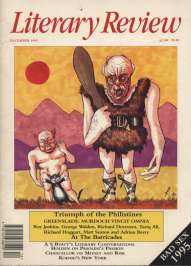Miranda France
National Trust View Not Needed
National Trust View Not Needed
By John Vincent
Duckworth 128pp £10.95
In 1928 George Bernard Shaw’s sister-in-law modestly asked him for ‘a few ideas on socialism’. History does not relate how pleased she was with Shaw’s immodest response, the 200,000-word Intelligent Woman’s Guide to Socialism and Capitalism. And that, as it happens, is John Vincent’s principal argument in a nutshell, for he believes that history depends on written evidence and that without evidence there can be no history. By not registering her feelings on paper, Shaw’s sister-in-law failed, on this point, to contribute to history.
She is not alone. In fact, Vincent says, almost no women have made any contribution to history at all, because they have failed to create any evidence. This, he allows, may be because ‘they had better things to do than live their lives on paper’. It could be that they

Sign Up to our newsletter
Receive free articles, highlights from the archive, news, details of prizes, and much more.@Lit_Review
Follow Literary Review on Twitter
Twitter Feed
The latest volume of T S Eliot’s letters, covering 1942–44, reveals a constant stream of correspondence. By contrast, his poetic output was negligible.
Robert Crawford ponders if Eliot the poet was beginning to be left behind.
Robert Crawford - Advice to Poets
Robert Crawford: Advice to Poets - The Letters of T S Eliot, Volume 10: 1942–1944 by Valerie Eliot & John Haffenden (edd)
literaryreview.co.uk
What a treat to see CLODIA @Lit_Review this holiday!
"[Boin] has succeeded in embedding Clodia in a much less hostile environment than the one in which she found herself in Ciceronian Rome. She emerges as intelligent, lively, decisive and strong-willed.”
Daisy Dunn - O, Lesbia!
Daisy Dunn: O, Lesbia! - Clodia of Rome: Champion of the Republic by Douglas Boin
literaryreview.co.uk
‘A fascinating mixture of travelogue, micro-history and personal reflection.’
Read the review of @Civil_War_Spain’s Travels Through the Spanish Civil War in @Lit_Review👇
John Foot - Grave Matters
John Foot: Grave Matters - Travels Through the Spanish Civil War by Nick Lloyd; El Generalísimo: Franco – Power...
literaryreview.co.uk